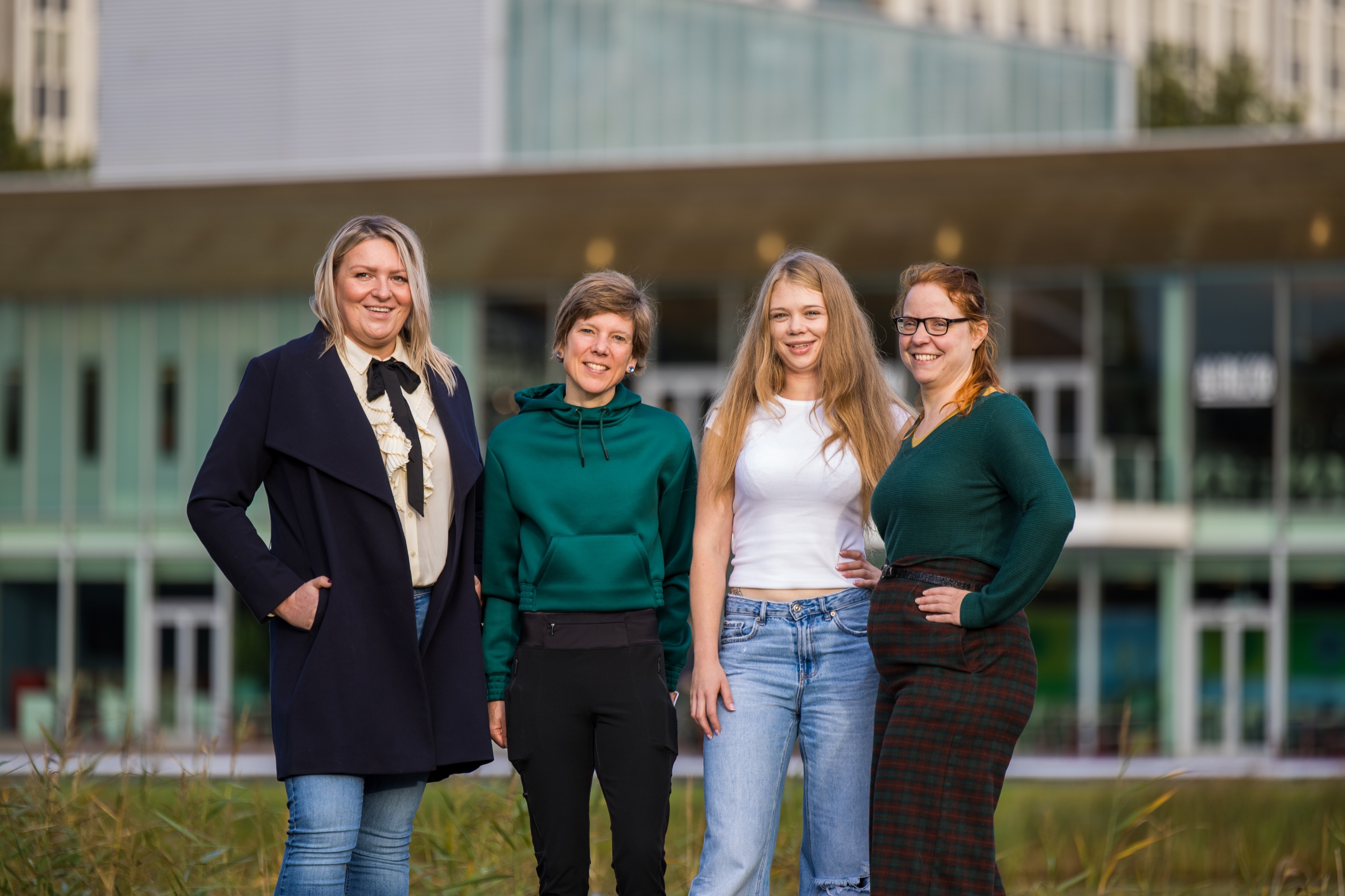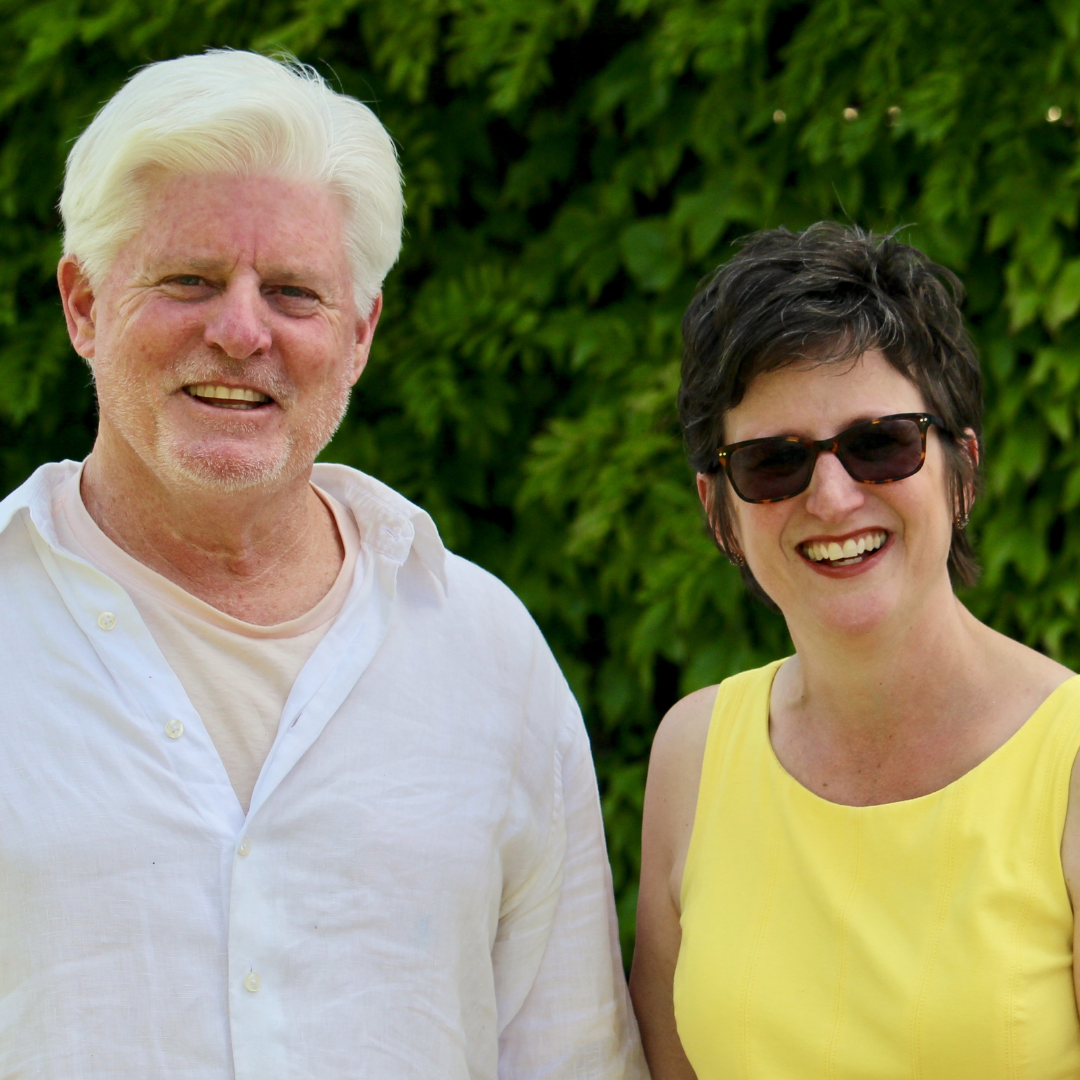


Maartje van der Zalm has never fit a mold. As a scientist, manager and advocate for women in technical fields, she has forged her path by blending creativity with precision. Now leading in-house operations at Salvia BioElectronics, a pioneering medical device company, she oversees and supports a dynamic (almost) all-female cleanroom team manufacturing life-changing devices for people with migraine worldwide.
Her journey into STEM was unconventional, shaped by a passion for both the arts and sciences. You could call Maartje a “left-brained scientist.” Her journey was not without challenges. Underestimated from an early age because of dyslexia, it was only in the last few years of secondary school when teachers began to see her potential. She pursued chemical engineering and built a career that balances innovation with a deep commitment to supporting other women.
 The almost all-female cleanroom crew at Salvia BioElectronics. From left: Marta Dobrowolska, Rian van der Burgt, Marta Jeziorska and Maartje van der Zalm. Crew members not pictured are Marian Ligori and Abdelilah Bahri.
The almost all-female cleanroom crew at Salvia BioElectronics. From left: Marta Dobrowolska, Rian van der Burgt, Marta Jeziorska and Maartje van der Zalm. Crew members not pictured are Marian Ligori and Abdelilah Bahri.
By the time Maartje van der Zalm’s academic aptitude showed itself, she was already interested in the arts. She did both. When her theater classes conflicted with the schedule of her upper-level studies in math, physics and chemistry, the entire class had to adjust – a move that stirred complaints from her mostly male classmates.
“In high school, I was the only girl in the class that followed the hard-core subjects,” she recalls. Her graduating class was known as “Maartje and the B-boys” with the letter B referring to “beta” courses, the Dutch term for STEM.
With talents in both fields, choosing a career path wasn’t easy.
“I wanted to prove to myself that I could do engineering. I loved chemistry and it came easily to me in high school, so I thought, ‘Let’s study chemical engineering.’ I thought I could always do art, but after an art education, I couldn’t see myself doing engineering,” she remembers.
The number of women improved slightly at the Eindhoven University of Technology, where approximately 10% of her first-year chemical engineering students were female. However, she never felt singled out for being female.
“I never felt that it was a focus. I felt more of an outcast because I came from a poor family, rather than being female,” Maartje says. “In my studies, I never really thought of the fact that I was a girl in a man’s world, but I started to feel this more in my career.”
Climbing the corporate ladder
After graduating and a stint at a startup making biofuels from wood chips, she dived into corporate life at Philips Research as a material scientist in the Applied Chemistry group. She worked to optimize ink for an inkjet process and then focused on microfluidic design for applications that included healthcare. Eventually, she moved to Philips Handheld Diagnostics (HHD), an emerging business within the group.
In her early career at Philips, people would openly ask what her plans were. They were not talking about career plans but instead her plans for a family.
“The best thing that happened to me was my manager at Philips HHD, Maarten de
Leuw. For the first time, I felt I was in a department where I would get a real equal chance. We were a great team, and I was at the point of entering the leadership program when the department was canceled and I moved to Salvia BioElectronics.”
Moving back to the startup world
After working at both a small startup and a huge company, Maartje could compare what she liked best at each.
“I realized that I feel the most passion when I have a direct influence on the development of a product I believe in. So, I looked into going back to a small company. As soon as I saw that Salvia was working on a device for migraine and cluster headache, I knew I wanted to work there, even though it was in a very early stage.”
“During my first interview with Hubert [Martens, Salvia CEO], he said, ‘I heard your name from two different people.’ Then, he started talking about migraine, asking, ‘Do you have any idea how much pain these patients are in?’ And I took out my medication and put it on the table.” Maartje suffers from cluster headache, and Salvia was at the top of her list of dream jobs.
Maartje took the job and joined Salvia in 2018, becoming employee No. 5. She is not only team lead, but also responsible for day-to-day cleanroom operations of the company.

Maartje van der Zalm, Team lead In-House Operations at Salvia BioElectronics
A mission to help people
“I wanted to find a way to apply engineering in fields that help people.” This has been a common thread in all of her positions in her career and it still is at Salvia.
Salvia has developed an ultra-thin, bioelectronic foil implant for people with migraine. With migraine attacks affecting more than one billion people worldwide each year, the company is helping people take power over these debilitating attacks and reclaim their lives.
Like many people coming to Salvia, the company’s mission is also their mission because of personal experience with migraine and headaches. Maartje is no different. She has suffered from debilitating cluster headache since university but is one of the lucky patients who has found a medication that can keep them in check.
All-female cleanroom
"Salvia’s implantable devices are all custom-made in their state-of-the-art cleanroom at High Tech Campus Eindhoven. What makes this cleanroom unique is its almost all-female team (at the time of writing, it was all women - but they’ve since hired a talented man as well). The team packs plenty of personality, making it as dynamic as it is skilled."
The almost all-female crew is not by coincidence. The job requires a detailed eye, very small movements, considerable work under a microscope and it’s still a very manual process.
“From the operators that visit us, women are more interested than men,” Maartje said. “I think most women look for something different in a job and find the atmosphere important. I work hard to create a different atmosphere. When I look for employees, I look for skills, personalities and communication.”
As the Team Lead, Maartje has a nickname. Her name is “Chef,” taking meaning from both the English and Dutch meanings of the word (“Sjef”). Not only is she the boss, but she also eats a lot and loves food. If she’s stressed, her operators are known to bring her food and drinks.
“I'm definitely a different type of manager than most people see as a manager. I make a decision if I need to make a decision. But as a team lead, I know that I'm also there to see what people need and find out how we can get the best out of our people.”
At Salvia, that is especially important. Before the company started in-house production, it was mainly a department of highly educated people who were thinking about designing a product, not about making the product. All the training around complex procedures was designed such that people read the document and then they understood it. End of story.
But operators in the cleanroom don’t fit that mold. Reading and understanding a very complex procedure don’t always work for them. So, Maartje has had to find a way to get everyone on board, train them effectively and make them feel valued.
“I think a lot of the women who work for me have been underestimated during their previous jobs. Here, they are the ones making the product. I do my best to make them feel like the stars of the company, because, in my opinion, without them, there is no product.”
Maartje works daily to ensure operators have everything they need and provide them with coaching and support. She pulls in people and resources when issues need to be solved because production – and thus the operators – have top priority within the company.
Redefining leadership
From her early engineering career to now leading the almost all-female cleanroom team, Maartje van der Zalm redefines what leadership looks like. For her, success isn’t a solo endeavor – it’s also about creating opportunities for others. Her leadership at Salvia embodies that philosophy, ensuring every team member is valued.
Maartje encourages any woman aspiring to a career in STEM to just go for it. “If you want something, go for it. Don’t doubt your possibilities. Do not get discouraged if you encounter setbacks. You will find a place where you are appreciated for your strengths.”